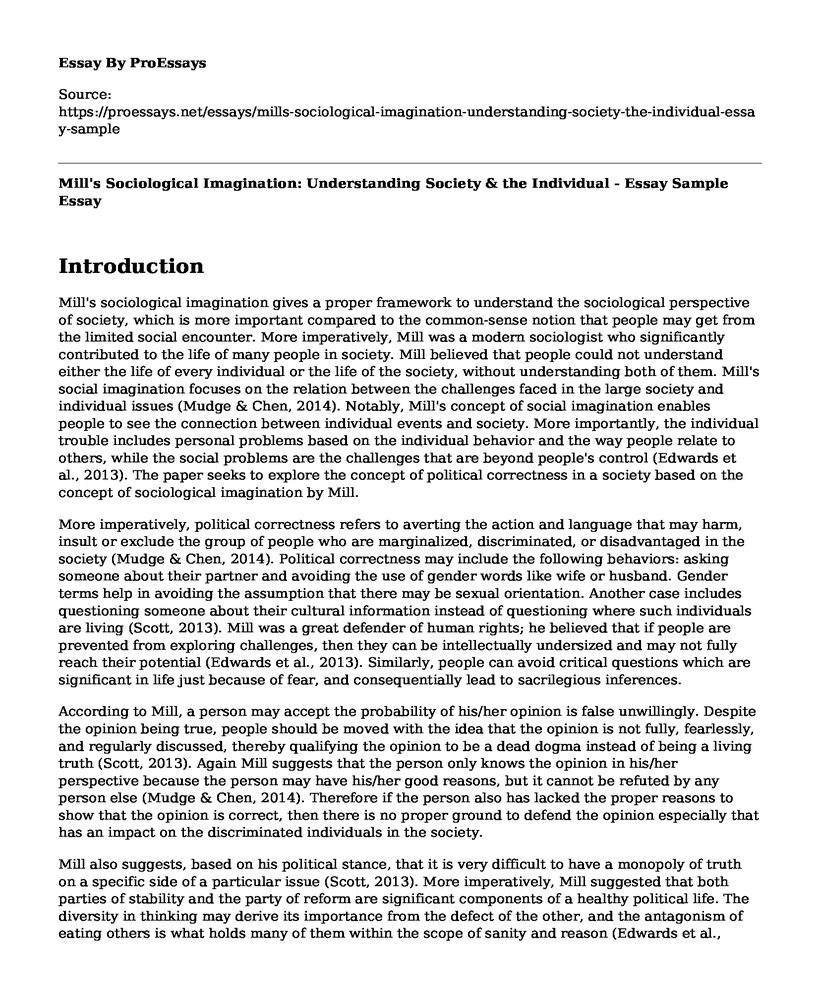Introduction
Mill's sociological imagination gives a proper framework to understand the sociological perspective of society, which is more important compared to the common-sense notion that people may get from the limited social encounter. More imperatively, Mill was a modern sociologist who significantly contributed to the life of many people in society. Mill believed that people could not understand either the life of every individual or the life of the society, without understanding both of them. Mill's social imagination focuses on the relation between the challenges faced in the large society and individual issues (Mudge & Chen, 2014). Notably, Mill's concept of social imagination enables people to see the connection between individual events and society. More importantly, the individual trouble includes personal problems based on the individual behavior and the way people relate to others, while the social problems are the challenges that are beyond people's control (Edwards et al., 2013). The paper seeks to explore the concept of political correctness in a society based on the concept of sociological imagination by Mill.
More imperatively, political correctness refers to averting the action and language that may harm, insult or exclude the group of people who are marginalized, discriminated, or disadvantaged in the society (Mudge & Chen, 2014). Political correctness may include the following behaviors: asking someone about their partner and avoiding the use of gender words like wife or husband. Gender terms help in avoiding the assumption that there may be sexual orientation. Another case includes questioning someone about their cultural information instead of questioning where such individuals are living (Scott, 2013). Mill was a great defender of human rights; he believed that if people are prevented from exploring challenges, then they can be intellectually undersized and may not fully reach their potential (Edwards et al., 2013). Similarly, people can avoid critical questions which are significant in life just because of fear, and consequentially lead to sacrilegious inferences.
According to Mill, a person may accept the probability of his/her opinion is false unwillingly. Despite the opinion being true, people should be moved with the idea that the opinion is not fully, fearlessly, and regularly discussed, thereby qualifying the opinion to be a dead dogma instead of being a living truth (Scott, 2013). Again Mill suggests that the person only knows the opinion in his/her perspective because the person may have his/her good reasons, but it cannot be refuted by any person else (Mudge & Chen, 2014). Therefore if the person also has lacked the proper reasons to show that the opinion is correct, then there is no proper ground to defend the opinion especially that has an impact on the discriminated individuals in the society.
Mill also suggests, based on his political stance, that it is very difficult to have a monopoly of truth on a specific side of a particular issue (Scott, 2013). More imperatively, Mill suggested that both parties of stability and the party of reform are significant components of a healthy political life. The diversity in thinking may derive its importance from the defect of the other, and the antagonism of eating others is what holds many of them within the scope of sanity and reason (Edwards et al., 2013). It is worth noting that the opposition of any practical life is often expressed with equal freedom unless the opinion is democratic.
Conclusion
In conclusion, Mill was a fighter of the right of the people, especially the disadvantaged group in society. Based on political correctness, Mill believed that people should not be prevented from experiencing challenges in life, because such people can be intellectually undersized and ignore issues that are important in social life. It is important to get from both sides of a particular issue, and that confirms the political correctness.
References
Edwards, A., Housley, W., Williams, M., Sloan, L., & Williams, M. (2013). Digital social research, social media and the sociological imagination: Surrogacy, augmentation and re-orientation. International Journal of Social Research Methodology, 16(3), 245-260. Retrieved from: https://www.tandfonline.com/doi/abs/10.1080/13645579.2013.774185
Mudge, S. L., & Chen, A. S. (2014). Political parties and the sociological imagination: past, present, and future directions. Annual Review of Sociology, 40. Retrieved from: https://www.annualreviews.org/doi/full/10.1146/annurev-soc-071312-145632
Scott, J. W. (2013). The Campaign Against Political Correctness. PC Wars: Politics and Theory in the Academy, edited by Jeffrey Williams, 22-44. Retrieved from: https://books.google.co.ke/books?hl=en&lr=&id=VaVlAgAAQBAJ&oi=fnd&pg=PT30&dq=Scott,+J.+W.+(2013).+The+Campaign+Against+Political+Correctness.+PC+Wars
Cite this page
Mill's Sociological Imagination: Understanding Society & the Individual - Essay Sample. (2023, Mar 22). Retrieved from https://proessays.net/essays/mills-sociological-imagination-understanding-society-the-individual-essay-sample
If you are the original author of this essay and no longer wish to have it published on the ProEssays website, please click below to request its removal:
- Essay on Purpose of Non-Verbal Communication
- Religion, Morals, and Slavery Essay
- Ethical Choices in the Design and Administration of Executive Compensation Programs
- Why Marriage Is No Longer Necessary in Today's Society and Has Lost Its Value
- Ethical and Moral Dilemma of a Defense Lawyer Essay
- Essay Sample on Political Cartoon Images
- Parents' Time at Work: Meeting Basic Needs and Luxuries - Essay Sample







